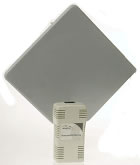Fifty days in to Ofcom’s existence, its Chair David Currie delivered a speech to the Communications Management Association conference. He recapped on what Ofcom had been doing, then outlined where he felt it was going, focusing mainly on broadband.
We feel the most exciting part of the speech was, in his words, True Broadband.
Anyone with a real understanding of why broadband is such a vital part of the future will be hugely encouraged by his words. In summary, what is currently being sold as broadband to the UK consumer and many other around the world, a 512k connection, is not broadband. It is the equivalent of a 1200/75-baud modem.
We heartily agree with Currie view that ‘DSL at 512k is a convenience product’. He argues that it is not practical or possible for the UK to lurch from a 512k connection to something much faster – the current copper-wire based system we have simply would not support it.
Instead a target of 10Mbps should be set for 2010 and that it should be provided competitively. We read this as; the long lasting monopoly that BT has, and does enjoy will be removed. His comparison with the multi-supplier mobile market bears this out. In our view BT consistently hoodwinked Oftel. At first glance it looks like they will not have the same joy with Ofcom.
This was further underlined by his praise of the Parliamentary Trade and Industry Select Committee point that
‘[we must] make certain that the regulatory framework ensures that commercial decisions by private companies are aligned with the wider economic and social needs of the country.’
He and his colleagues clearly recognise and understand what is required for a proper broadband service. With connections being symmetric rather than the slow transmit, asymmetric we have now, he identified the need for the network to enable distributed system, not just central services delivering to the ends of the network. We also find it encouraging that he reiterated the pursuit of wireless connections.
Currie states his aim is ‘Liquid bandwidth; all you can eat; always on. No contention.’
Very encouraging.
Full text
David Currie, Ofcom chairman, Communications Management Association Annual Conference, 16 February 2004
 Their new approach is to provide high-speed connections to a central point, then distribute to households that have uninterrupted, line-of-site to the antenna (picture right) mounted on top of the subscribers rooftop. Labelled as P2MP (Point to MultiPoint), it provides a two-way connection that will, in their words, supply connections of a similar speed to 512k ADSL.
Their new approach is to provide high-speed connections to a central point, then distribute to households that have uninterrupted, line-of-site to the antenna (picture right) mounted on top of the subscribers rooftop. Labelled as P2MP (Point to MultiPoint), it provides a two-way connection that will, in their words, supply connections of a similar speed to 512k ADSL.